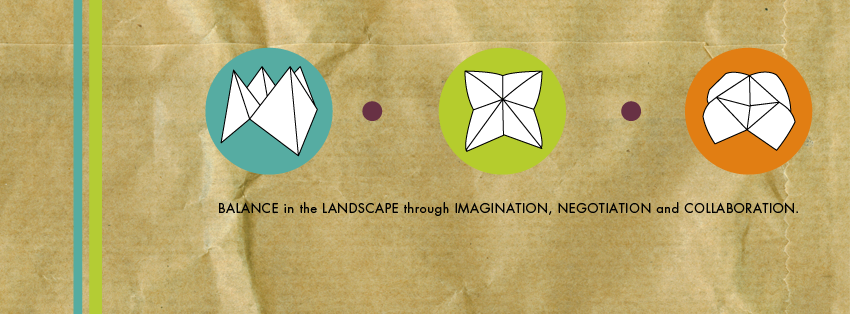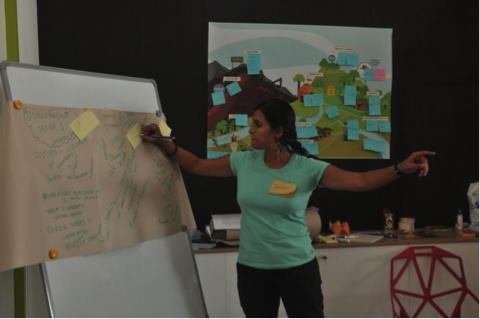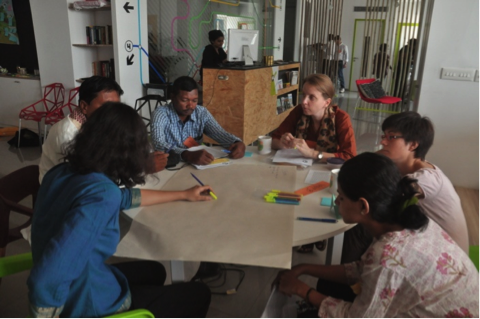 BLINC, a two day workshop-cum-exhibition organised by Natural Justice and designed by the LED Laboratory at the Srishti School of Art, Design, and Technology, was held in Bangalore on June 27 and 28, 2014. BLINC’s vision is to bring Balance in the Landscapethough Imagination, Negotiation and Collaboration. The Workshop brought together NGOs, academics, activists, designers and individuals or groups interested in the overarching theme of ‘Asserting community rights over the environment’.
BLINC, a two day workshop-cum-exhibition organised by Natural Justice and designed by the LED Laboratory at the Srishti School of Art, Design, and Technology, was held in Bangalore on June 27 and 28, 2014. BLINC’s vision is to bring Balance in the Landscapethough Imagination, Negotiation and Collaboration. The Workshop brought together NGOs, academics, activists, designers and individuals or groups interested in the overarching theme of ‘Asserting community rights over the environment’.On Day 1, participants were introduced to a fictitious landscape called Ravalgaon, which is faced with several challenges that are commonly encountered by the participants at BLINC when they engage with local communities in their individual context areas. A visual representation of the landscape (the map) was then displayed. Participants were asked to pick a stakeholder from the map and put themselves in their shoes, in a process called ‘empathy walk’.
 Interestingly, participants picked stakeholders whose perspective they do not usually consider during the course of their work, such as the miners and corporations, in order to better understand their mindset. Some picked the represented communities, as they personally identified with the issues faced by them, and also in order to explore the push-and-pull relationship between the environment and the economy. One participant picked the forest because everything depends on it, while another picked agricultural land because organic farming is the future. The perspective of a priest in the local temple was picked to be an entry point into exploring the relationship between culture and religion with the environment.
Interestingly, participants picked stakeholders whose perspective they do not usually consider during the course of their work, such as the miners and corporations, in order to better understand their mindset. Some picked the represented communities, as they personally identified with the issues faced by them, and also in order to explore the push-and-pull relationship between the environment and the economy. One participant picked the forest because everything depends on it, while another picked agricultural land because organic farming is the future. The perspective of a priest in the local temple was picked to be an entry point into exploring the relationship between culture and religion with the environment.The participants were then divided into three groups, and carried out an ‘affinity mapping’ exercise, whereby they identified stakeholder issues and clubbed issues together into broader themes based on similarities/affinities/consensus.
The process was interactive and thought-provoking, and brought out some of the real-life dynamics of interactions between different stakeholders. The three groups then re-assembled, and discussed insights from their discussions, whereby several interesting pointers emerged, such as how addressing trust issues between different stakeholders is key to productive dialogue, and how livelihoods can remain while culture can be dynamic and evolve through exposure to other environments, which may be a positive development, and the cathartic effects of migration.
Finally, the identified issues were brought within the three overarching themes of the BLINC conference:
- External and internal influences on communities
- Conservation and development desires
- Conflict transformation
New groups formed under each of these three themes, and proceeded to discuss each in detail. An exercise called the ‘five why’s’ was carried out, in order to arrive at the root of a specific issue under each theme. Groups were then asked to reflect on and critique the process followed by other groups, and their feedback was re-analysed by the original groups. After critical reflection, groups reflected on practical action steps that could be taken to address the issue identified, at the root.
On Day 2 of the workshop, the thematic groups reconvened and brainstormed further on solutions to specific issues faced in particular field contexts. Each group chose a specific issue in a particular context, and identified action steps to address it, using the approaches and themes identified at BLINC. Each group then presented their concrete action plans to all, along with realistic timelines, and legal and other tools to be employed, and gained feedback. This marked the end of the workshop.
The Natural Justice India team officially launched Guftagu, a website conceptualised as a platform to capture narrative pieces, photo stories, videos and interviews reflecting on the experiences of lawyers and other professionals working with communities. The website also has a separate tab dedicated to follow up articles emerging from the themes of the BLINC conference.
There was a public exhibition in central Bangalore where boards were displayed to the general public, showcasing a short write-up and photos each, of the BLINC concept, the work of Natural Justice, the LED Lab, NJ’s local partner NGO’s, and other organisations which work with local communities.

